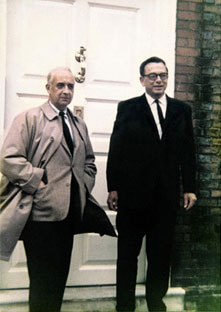Lionel Trilling on not accepting alienation

Lionel Trilling and Quentin Anderson in front of Lamb House in Rye, England
Who that has had experience of our social reality will doubt its alienated condition? And who that has thought of his experience in the light of certain momentous speculations made over the last two centuries, of which a few have been touched on in these pages, will not be disposed to find some seed of cogency in a view that proposes an antinomian reversal of all accepted values, of all received realities?
But who that has spoken, or tried to speak, with a psychotic friend will consent to betray the masked pain — his bewilderment and solitude — by making it the paradigm of liberation from the imprisoning falsehoods of an alienated social reality? Who that finds intelligible the sentences which describe madness (to use the word that cant prefers) in terms of trascendence and charisma will fail to penetrate to the great refusal of human connection that they express, the appalling belief that human existence is made authentic by the possession of a power, or the persuasion of its possession, which is not to be qualified or restricted by the co-ordinate existence of any fellow man? . . .
Perhaps exactly because the thought is assented to so facilely, so without what used to be called seriousness, it might seem that no expression of disaffection from the social existence was ever so desperate as this eagerness to say that authenticity of personal being is achieved through an ultimate isolateness and through the power that this is presumed to bring. The falsities of an alienated social reality are rejected in favor of an upward psychopathic mobility to the point of divinity, each one of us a Christ — but with none of the inconveniences of undertaking to intercede, of being a sacrifice, of reasoning with rabbis, of making sermons, of having disciples, of going to weddings and to funerals, of beginning something and at a certain point remarking that it is finished.
— Lionel Trilling, Sincerity and Authenticity, quoted in Quentin Anderson, Lionel Trilling at Columbia


0 Comments:
Post a Comment
<< Home